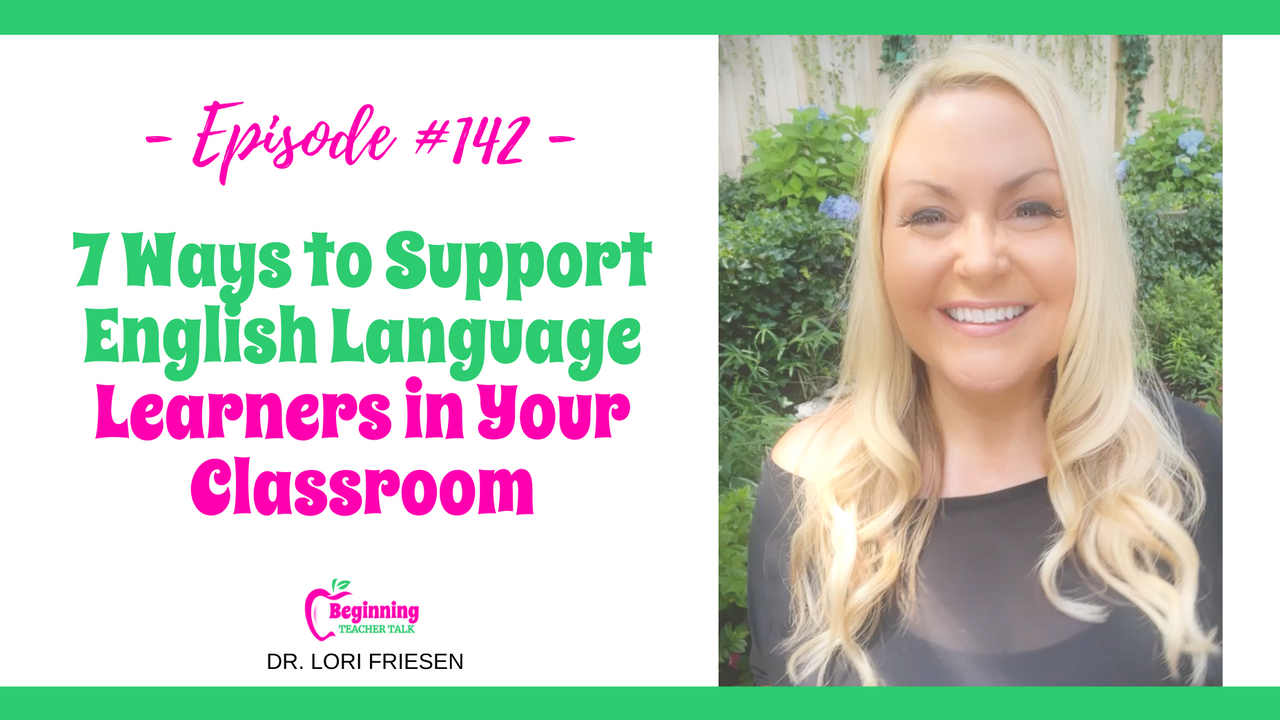7 Ways to Support English Language Learners in Your Classroom

Click the play bar below to listen to this week's show now:
Show Notes:
Today we’re discussing a topic that is very near and dear to my heart, which is supporting English language learners. If you've been listening to my podcast for awhile now, you already know that I've always loved to travel. What you might not know is that after my first year in University, I took two years off to explore the world. During those two years, I ended up living in Hong Kong for part of that time where I taught English as a second language. I also had several private ELL tutoring students.
That experience teaching in Hong Kong was so impactful for me and I enjoyed it so much that I decided to come back to Canada and complete my degree with a focus on teaching English as a second language. Once I graduated from the University of Lethbridge, with my BA and my B.Ed, I spent a year teaching in Japan.
All of that to say, I have a lot of experience working with English language learners. I know how challenging it can be when you have students who don't speak a lot of English in your classroom, especially if you don't have much experience teaching students who don't have a lot of experience with the English language.
From the perspective of an English language learner, when they're unable to communicate very well in English, it's really easy for them to feel isolated because they don't know the language. It's hard for them to be involved in conversations and to be playful with their classmates until they have a solid foundation of language.
It’s important to know that when you're learning a second language, out of all of the literacy skills, spoken language comes last. Students who are learning a second language are usually able to comprehend first, so they'll start to understand what they're hearing first, long before they're able to communicate using their own words. This is why your ELL students may be super quiet. Their silence doesn’t mean that they aren’t learning. It just will take them some time to take the risk of speaking out loud, and that’s very common.
With some modifications to your classroom, the use of simple resources, and the help of peers, it is totally possible to create a welcoming environment for your English language learners. It’s an incredible joy to watch the progress that these students make over the course of weeks, months, and years! I’m going to share some really great practical strategies and ways that you can support ELLs during the time they are in your classroom and beyond.
Inside this week's show, you'll learn:
- Practical and effective ways to support your English language learners.
- How labeling everything in your classroom will be helpful for your ELL students.
- Why a picture dictionary is an invaluable tool.
- What it means if your ELL student seems very tired by the end of the day.
- My recommendations on bringing in a translator.
- Examples of conversational English phrases to teach and practice.
Links & resources mentioned inside this episode:
- Shop my Chalkboard Brights Decor: Classroom Organization Labels with Pictures.
- Shop my Farmhouse Chic Classroom: Classroom Organization Labels with Pictures.
- Check out my First-Year-Teacher Bundle for November inside my TpT Store.
I hope this information is helpful as you prepare for your first, second, or third year of teaching. Until next time, remember, just because you're a beginning elementary teacher, there's no need for you to struggle like one.
💛 Lori
 Dr. Lori Friesen | Beginning Teacher Mentor
Dr. Lori Friesen | Beginning Teacher Mentor
Creator of the R.E.A.D.Y. for School Academy, Dr. Lori Friesen has mentored thousands of beginning teachers across the country through her workshops and courses. Host of the popular podcast, Beginning Teacher Talk, and creator of the innovative literacy program for 1st and 2nd grade, Dogs Help Kids Read and Succeed, Dr. Lori is dedicated to serving educators and inspiring learners. Learn more at drlorifriesen.com and at howdogshelpkids.com.
Want to listen on a different platform? Here are the links:
Click here to listen on Apple Podcasts.
Click here to listen on Spotify.
Click here to listen on Stitcher.
Click here to listen on iHeart Radio.
Related episodes you might enjoy:
- How to Differentiate Any Lesson
- 10 Fantastic First-Week-of-School Activities: Teach Your Expectations & Create a Caring Classroom Community
- Create a Caring Classroom Community in the First Week of School (Even When Social Distancing)
- Ultimate Student Engagement: 5 Positive, Easy, & Creative Ways to Get & Keep Your Students’ Attention
- How to Stay Motivated and Focused When it Feels Hard
- How to Be Confident when Communicating with Parents
Follow:
Are you following my podcast? I release fresh, new content every single week and I don't want you to miss out! 💛 Click here to follow on Apple Podcasts.
Leave a Review ⭐️⭐️⭐️⭐️⭐️
If you are loving the podcast, I would be so grateful if you would leave me a review over on Apple Podcasts. Each time you leave a review, Apple Podcasts recommends my podcast to other new teachers so they feel a little less alone as they navigate their first few years of teaching. Just click here to review, select “Ratings and Reviews” and “Write a Review” and let me know how this podcast is helping you inside your classroom!
Stay connected for surprise goodies & updates!
Join our mailing list to receive the latest news from our team. 💛💕 Your information will not be shared.













